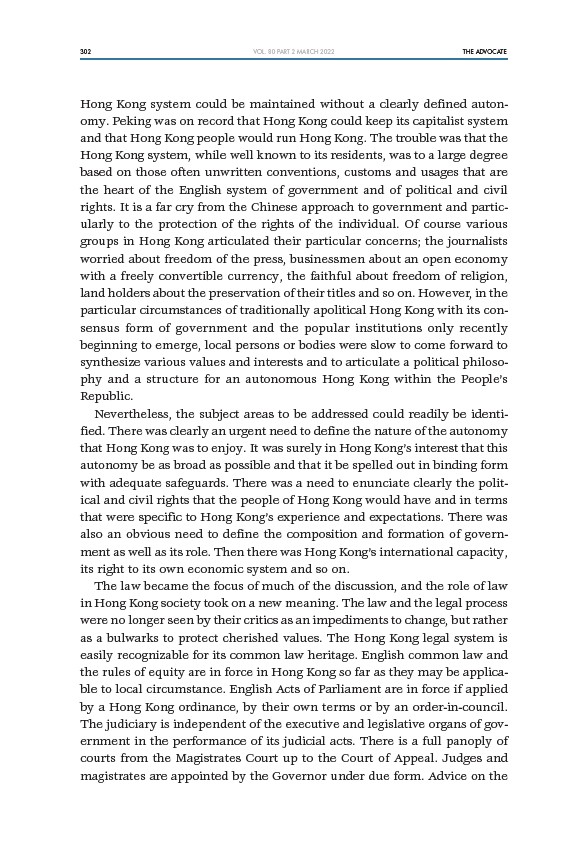
302 THE ADVOCATE
VOL. 80 PART 2 MARCH 2022
Hong Kong system could be maintained without a clearly defined autonomy.
Peking was on record that Hong Kong could keep its capitalist system
and that Hong Kong people would run Hong Kong. The trouble was that the
Hong Kong system, while well known to its residents, was to a large degree
based on those often unwritten conventions, customs and usages that are
the heart of the English system of government and of political and civil
rights. It is a far cry from the Chinese approach to government and particularly
to the protection of the rights of the individual. Of course various
groups in Hong Kong articulated their particular concerns; the journalists
worried about freedom of the press, businessmen about an open economy
with a freely convertible currency, the faithful about freedom of religion,
land holders about the preservation of their titles and so on. However, in the
particular circumstances of traditionally apolitical Hong Kong with its consensus
form of government and the popular institutions only recently
beginning to emerge, local persons or bodies were slow to come forward to
synthesize various values and interests and to articulate a political philosophy
and a structure for an autonomous Hong Kong within the People’s
Republic.
Nevertheless, the subject areas to be addressed could readily be identified.
There was clearly an urgent need to define the nature of the autonomy
that Hong Kong was to enjoy. It was surely in Hong Kong’s interest that this
autonomy be as broad as possible and that it be spelled out in binding form
with adequate safeguards. There was a need to enunciate clearly the political
and civil rights that the people of Hong Kong would have and in terms
that were specific to Hong Kong’s experience and expectations. There was
also an obvious need to define the composition and formation of government
as well as its role. Then there was Hong Kong’s international capacity,
its right to its own economic system and so on.
The law became the focus of much of the discussion, and the role of law
in Hong Kong society took on a new meaning. The law and the legal process
were no longer seen by their critics as an impediments to change, but rather
as a bulwarks to protect cherished values. The Hong Kong legal system is
easily recognizable for its common law heritage. English common law and
the rules of equity are in force in Hong Kong so far as they may be applicable
to local circumstance. English Acts of Parliament are in force if applied
by a Hong Kong ordinance, by their own terms or by an order-in-council.
The judiciary is independent of the executive and legislative organs of government
in the performance of its judicial acts. There is a full panoply of
courts from the Magistrates Court up to the Court of Appeal. Judges and
magistrates are appointed by the Governor under due form. Advice on the